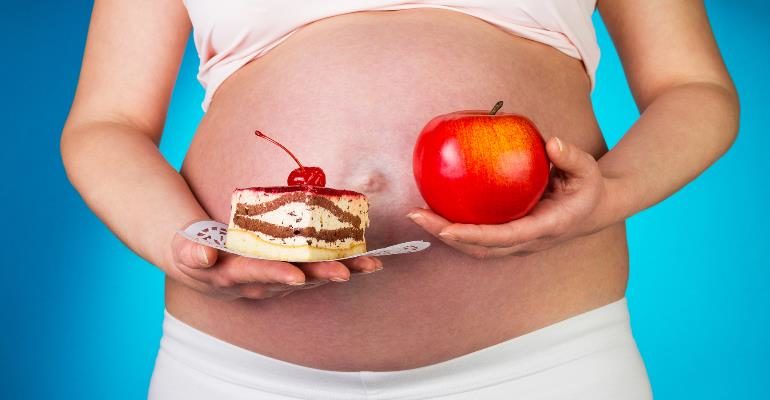
For a lot of women who are getting pregnant for the first time, it is very important for them to become aware of the importance of correct nutrition because now you are not only thinking about the wellness and health of the unborn baby but also of your own health. Pregnant women should start by eating moderate amounts of good wholesome food when they are pregnant in order for their baby to obtain all the necessary nutrients for them to grow and to become strong and healthy.
A Word on Portions
Do not overeat and resist following the common misconception of ‘eating for two’. Eat moderately so that your weight gain will be more reflective of what you and your baby actually needs in the form of energy. A pregnant woman needs only about 100 to 300 extra calories per day. Remember the little one growing inside you is a tiny little thing and not a baby elephant! A woman who follows a sensible and natural approach to eating during pregnancy will not only be able to remain light and nimble on her feet but will also increase her chances of returning faster to her natural body weight after childbirth.
You must avoid alcohol, soft cheeses, caffeine, shellfishes like oysters etc. at all costs. Avoiding caffeine for example can be very difficult to adjust to over and above all the other changes happening in one’s body. But you must try to inculcate healthy eating habits that will carry you forward and ensure the well-being of the future generations. Regularly practising yoga during pregnancy will help a woman to become more intuitive about her body’s needs. So try and also be more mindful about what you eat. Indulging in a few treats is just about fine but you and your baby will require good all-round nutritional fitness in order to ensure a smooth pregnancy and a healthy baby.
Diet in the First Trimester
With hormone swings and morning sickness, try to eat a minimum quantity of food but eat often so that your blood sugar and energy levels are balanced. Drink ginger tea in order to calm nausea.
Diet in the Second Trimester
By this time, a woman’s appetite will increase and nausea will subside. So enjoy eating a wide variety of wholesome and natural foods. Eat lots of fresh fruits and vegetables/
Diet in the Third Trimester
This is the time when a woman experiences a drop in energy levels due to the increased growth of the baby. It is important now to maintain a varied diet by eating smaller portions more often again.
After Childbirth
Breastfeeding women will need to increase her liquid intake and limit the intake of caffeine, alcohol and spicy foods. Otherwise, simply maintain a healthy diverse diet in order to support the body after birth.
Foods to Enjoy
Fruit
Do not eat more than 3 portions of fruit in a day as fruit is high in natural sugar. You can have pineapple and papaya for digestion. Apples, pears, apricots, nectarines, berries and avocado are easily digestible.
Vegetables
Eat a wide variety of veggies in order to increase your vitamin and mineral intake. If you are suffering from digestive problems, limit intake of cauliflower, cabbage, green peppers and tomatoes which can be highly acidic.
Carbohydrates
Brown rice, sweet potatoes, pumpkin, oats, lentils and quinoa all release energy steadily and are also easy to digest.
Protein
Have a moderate amount of protein after cooking it well. You can have meat, poultry, eggs, beans, paneer, tofu and pulses to ensure that you get enough protein to promote the healthy growth of your baby.
Omega 3
Again moderation is the key. Eat a moderate amount of oily fishes such as salmon and mackerel which helps with brain growth.
Dairy
Calcium-rich foods such as Eggs, milk, butter and hard cheeses can all be had in reasonable amounts in order to promote bone growth. Dairy products can increase mucus in the body; so reduce your intake if you have cold or nasal swelling.
Foods to Avoid
Excess of Fruit
Do not consume too much fruit and avoid bananas if constipated.
Wheat Products
Consume in moderation and eat more of healthier wheat products like whole wheat bread and whole wheat pasta.
Processed Foods
Eliminate fizzy drinks, chocolates, biscuits, cakes and chips as they are low in nutrients and quite high in fat and salt content which will cause too much of weight gain and water retention.
Certain fish
Avoid Tunafish as it contains high levels of mercury. Also avoid raw shellfish.
Coffee or Tea
Drink in moderation or take it off your diet completely as they affect heart rate.
Remember if you’d like a more customized pregnancy diet plan adapted to your family’s food palate and preferences, you can always call on 98206 07875 and come over and visit me at our Dietetics Centre in Andheri West. Alternatively, I am also available for phone consultations. Stay healthy as always!
Author – Krupa Parekh
 Krupa is a dietician and nutritionist based in Mumbai and consults at our Andheri West Centre for our clients in Diabetes and Obesity Management, Detoxification therapy and specializes in creating bespoke Nutrition plans for kids, teenagers and adults by integrating correct food habits around one’s lifestyle. Read more about Krupa here – http://www.krupaparekh.in/.
Krupa is a dietician and nutritionist based in Mumbai and consults at our Andheri West Centre for our clients in Diabetes and Obesity Management, Detoxification therapy and specializes in creating bespoke Nutrition plans for kids, teenagers and adults by integrating correct food habits around one’s lifestyle. Read more about Krupa here – http://www.krupaparekh.in/.
Do not miss a single article!
Submit your email id to get new articles directly into your email inbox!
- Zumba Dance Fitness at Byjus - February 25, 2020
- History of Corporate Wellness Programs - February 18, 2020
- Yoga at a Conference - December 11, 2019




Add Review